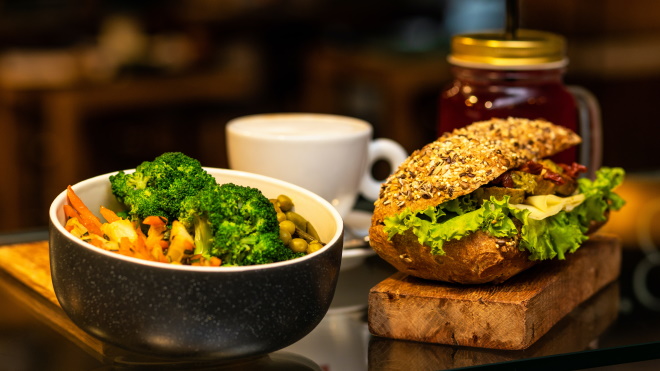
Health x Wellness
The future is here, and it’s looking green with plant-based nutrition
In recent years, sustainability has jumped to the top of the agenda for many consumers as an issue of significant concern. World Environment Day and Earth Day, in particular, have led consumers to become more cognisant of the impact of their actions on the planet.
More of us are realising the undeniable link between the food we eat and its environmental effects. This has steered people to set their sights on plant-based nutrition, with nearly one in two consumers across the globe being very interested in this type of diet, according to a recent consumer survey.[1]
Turning to a plant-based diet does not mean that you strictly forsake meat or dairy. Rather, you are choosing to incorporate more foods from plant sources into your diet. Besides plant-based staple foods, this also comprises alternative products to meat, sausages, fish, dairy or bakery and sweets.
Besides its benefits to environmental welfare, the health advantages of a plant-based diet are also slowly gaining recognition amongst the masses especially after the pandemic resulted in heightened prioritisation of health and nutrition. A recent web-based survey among healthcare workers indicates that a plant-based diet is related to a lower risk to develop moderate to severe COVID-19 infections[2], and 70 percent of consumers also state that promoting long-term health is an extremely or very important driver for their switch to plant-based nutrition.[3]
Keeping flexitarians on manufacturers’ radars with plant-based nutrition
Asians are no stranger to plant-based diets. Food such as tofu, tempeh, and mock meats are very common in our daily lives, and widely consumed by the population. However, what has really driven the market in the last 2-3 years is the uptake of plant-based foods by flexitarians[4] — people who have a primarily vegetarian diet but occasionally consume meat and fish. Globally, around one in four consumers already identify as flexitarian.[5] This group of consumers is a key driver of the plant-based boom, since they seek to diversify their diets with more plant-based options.
Understanding the key motivations and expectations for this group will hence be critical to ensure manufacturers’ success in a market that is rapidly expanding. BENEO’s research[6] found that the top drivers for flexitarians to purchase meat and dairy alternatives boil down to how natural its ingredients are, whether they help them take care of their bodies, and the variety they bring to their diets. Not surprisingly, taste also emerged as a key driver for repeat purchases. But an issue remains is that even though it factors as an important buying incentive for flexitarians, 28 percent of Asian consumers still believe that plant-based food and drink tastes bland and boring[7].
The great news is that with the advancement of technology now, the plant-based nutrition market has progressed by leaps and bounds. Food manufacturers are now able to introduce plant-based meat, fish or dairy alternatives that are increasingly similar to the original in terms of taste and texture — a key factor for consumers when choosing plant-based options in the supermarket. This further caters to the palate of consumers to promote enjoyment and provides more options for flexitarians, thus contributing to the plant-based trend in the region.
Food producers hence have the opportunity to reinvent their catalogues to include more plant-based ingredients to meet consumer and market demands. Already, a wide variety of ingredients is available which they can tap into.
Reformulating with taste and texture, top-of-mind
For instance, BeneoPro W-Tex, a textured wheat protein, enables the creation of meat-free products such as burger patties, sausages, or even dim sum fillings with a stable and authentic bite. With its fibrous structure after hydration, it can emulate a meat-like juicy texture while also being easily flavoured with a variety of herbs and spices — making it an optimal meat substitute that meets consumer standards.
BENEO’s portfolio of functional rice ingredients enables producers of plant-based foods to meet clean label requirements and to support transparent ingredient lists. Additionally, the use of these ingredients provides several technical benefits. As natural texturisers in dairy alternatives, rice starch and flour provide a creamy and smooth mouthfeel, while ensuring a clean taste and colour at the same time. Moreover, rice starch can serve as a binding agent in meat alternatives and offers good shelf-life stability and freeze-thaw functionality.
Getting ready for the plant-based future
As consumers’ health consciousness and awareness of climate impacts of animal agriculture continue to grow, we will only see more people joining in on the green food movement.
Having a keen understanding of purchasing behaviour among key target groups will go a long way in enabling manufacturers to reformulate better to meet consumer expectations. Fortunately, there already exists a myriad of readily available ingredients at their disposal, enabling food manufacturers to support the plant-based future and empower consumers in the region to achieve their sustainability and health goals.

[1] BENEO Global Plant-Based Survey, 10 countries surveyed in 2021
[2] Kim H, Rebholz CM, Hegde S, et al, Plant-based diets, pescatarian diets and COVID-19 severity: a population-based case–control study in six countries. BMJ Nutrition, Prevention & Health 2021;4:doi: 10.1136/bmjnph-2021-000272
[3] Health Focus International, Global Trends Study, 2020
[4] Euromonitor, Going Plant-Based: The Rise of Vegan and Vegetarian Food
[5] BENEO Global Plant-Based Survey
[6] BENEO Global Plant-Based Survey 2021 (Filter: Meat & Fish Consumers & Flexitarian)
[7] FMCG Gurus: Health and Wellness: Plant for the Planet in 2022, February 2022
Photo by Farhad Ibrahimzade on Unsplash






